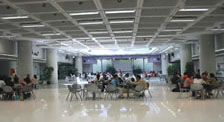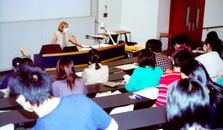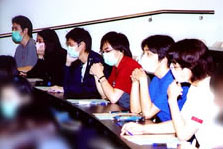Ready, set, let's take temperatures
To ensure maximum public health safety and ease of heart for thousands of students and invigilators at the examinations that start on 5 May, the University, through the Ad Hoc Group on Monitoring SARS and the Academic Regulations and Records Office (ARRO), has decided on a number of extra precautionary measures.
First, students are required to measure their body temperature at home or on campus before going to their examinations. During examinations, all students and staff (as invigilators) are required to wear face masks, which, by now, have become part of life on campus. Second, after each session, all examination venues will be disinfected and ventilated with the maximum possible intake of fresh air. Staff and contractors of the Facilities Management Office, who have already worked extra hard over the past few weeks scrubbing floors, sanitizing toilets and cleaning escalator handrails, for example, are expected to provide such services with gusto. Third, examination seating for students, wherever possible, will be more spread out than before. This will help not only minimize the risk of spreading the SARS virus, which is very unlikely on campus, but will also put everyone's heart at ease. Invigilators, on the other hand, will also be provided with a paraphernalia of sanitary products, if needed, to help them discharge their duties: face masks, plastic disposable gloves and temperature probes. Temperature taking, hopefully a one-time requirement that will not be repeated in the future, will be carried out on an "honour" basis by students themselves. The Ad Hoc Group believes that temperature taking will greatly minimize the health risk for everyone, even for students who have, or are suspected to have, a fever. A blanket arrangementNfor every candidate to have his/her temperature taken at the exam venueNhowever, is impossible to arrange because of the sheer number of participants involved. In Semester B, CityU has close to 11,000 full-time and part-time students taking examinations, scheduled between 5 and 17 May, each sitting for three to five subjects on average. All in all, some 50,000 candidates/sittings for thousands of courses are arranged over the 13-day period, in three daily sessions. In peak times, usually the evenings, as many as 30 on-campus venues are operated, ranging from small classrooms that can accommodate 30 students to the Chan Tai Ho Multi-purpose Hall that can seat up to 1,000.
Rising to this challenging time, the Ad Hoc Group and the ARR" have drawn up a set of guidelines and made a number of additional logistic arrangements:
- All students should make sure that they do not exhibit any of the SARS symptoms, in particular a fever, before they attend any examinations. Those students who have come into close contact with one or more confirmed SARS patients within 10 days before an examination are required to be quarantined at home.
- Students who suspect they may have a fever or feel they need to have their body temperature taken can approach, between 9am and 6:30pm , the two specially set-up health counters, located at the covered terrace and at the Pedestrian Entrance, 3/F Academic Building.
- Invigilators will be asked to check the body temperature of those students at the Chan Tai Ho Multi-purpose Hall who show signs of fever, or who wish to take off their masks for a short while during examinations. They will be provided with a number of handheld infra-red temperature scanners. These devices were bought from a research institute in Shenzhen on 24 April, after University staff spent two busy days scrambling to track down available suppliers. The devices are small, lightweight and easy to operate. Best of all, they require no more than focusing a blip of infra-red light on a student's forehead, from four to six inches away. It requires less than two seconds for a reading and involving no skin contact with the student. Invigilators at the other venues are required to take students" temperatures, also on a need basis, using ear thermometers. The University has ordered 70 of these devices.
- Students who are found to have a body temperature exceeding 38 degrees Centigrade will be required to leave the examination venue. They will be given make-up examinations or equivalent forms of assessment later, with no adverse effects on their results.
- Students who sneeze or cough repeatedly during examinations will be asked to take their examinations in a corner of the room/hall or in a separate venue, after their body temperatures have been checked.
These arrangements have been specially drawn up for on-campus written examinations. Earlier, when classes resumed, the University encouraged academic staff to go for other forms of end-of-semester assessment, including take-home or on-line examinations, in the hope of alternating the demand on student workloads within a shortened period of time. Such alternative arrangements will also help to reduce the need for a large number of students to remain in a single venue for an extended period of time.
Despite these new arrangements, the University stresses that the Code of Student Conduct will still govern all forms of assessment. The quality of assessment is still stringently adhered to, even though a certain degree of flexibility has been introduced to its formats.


